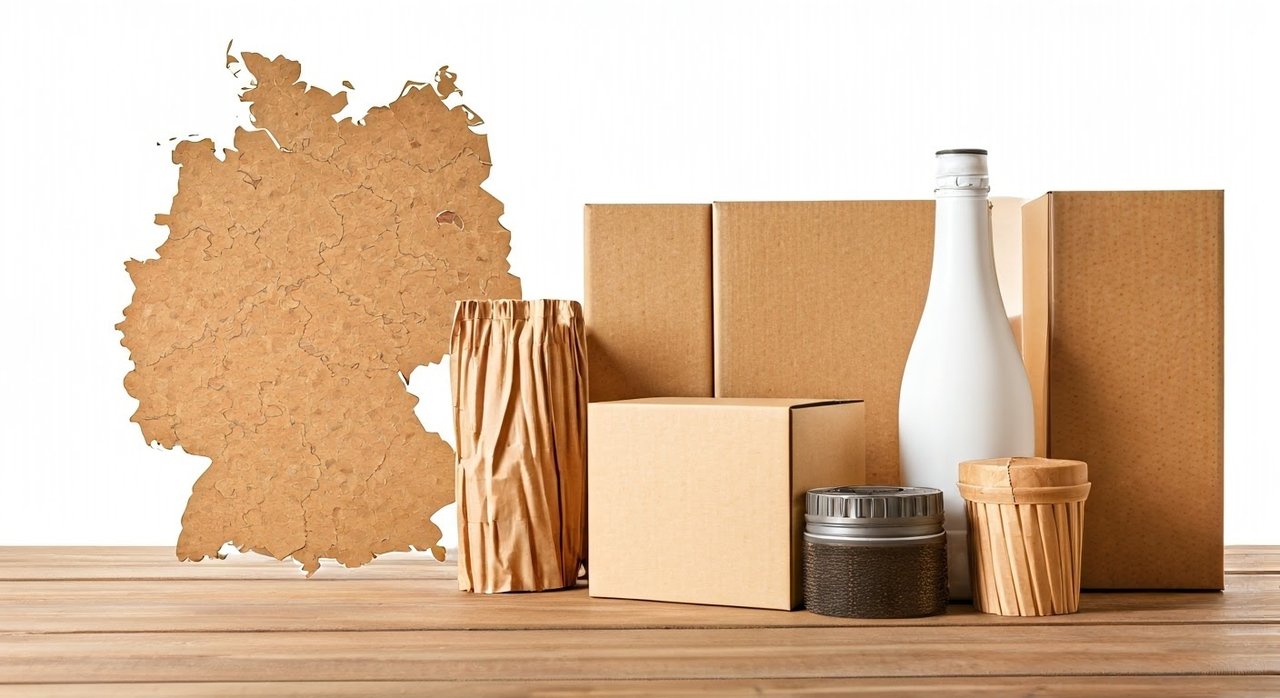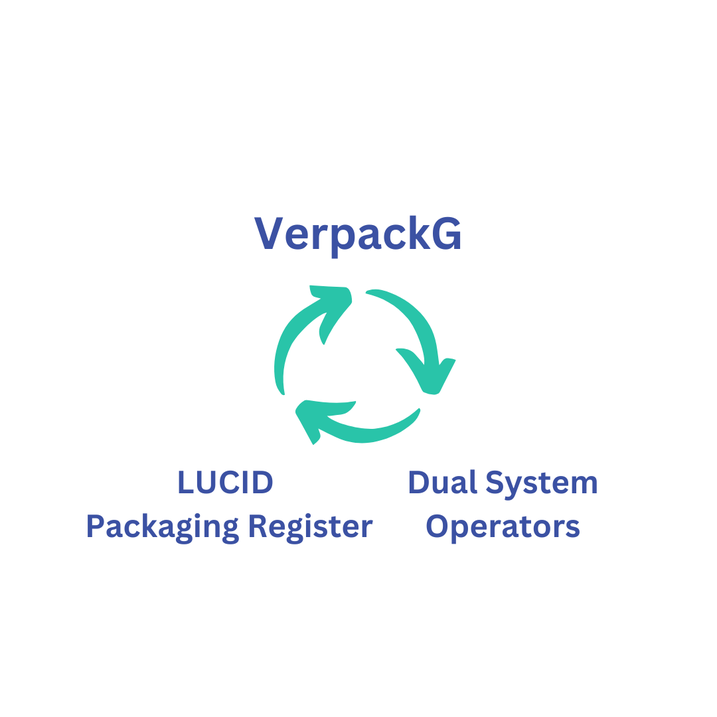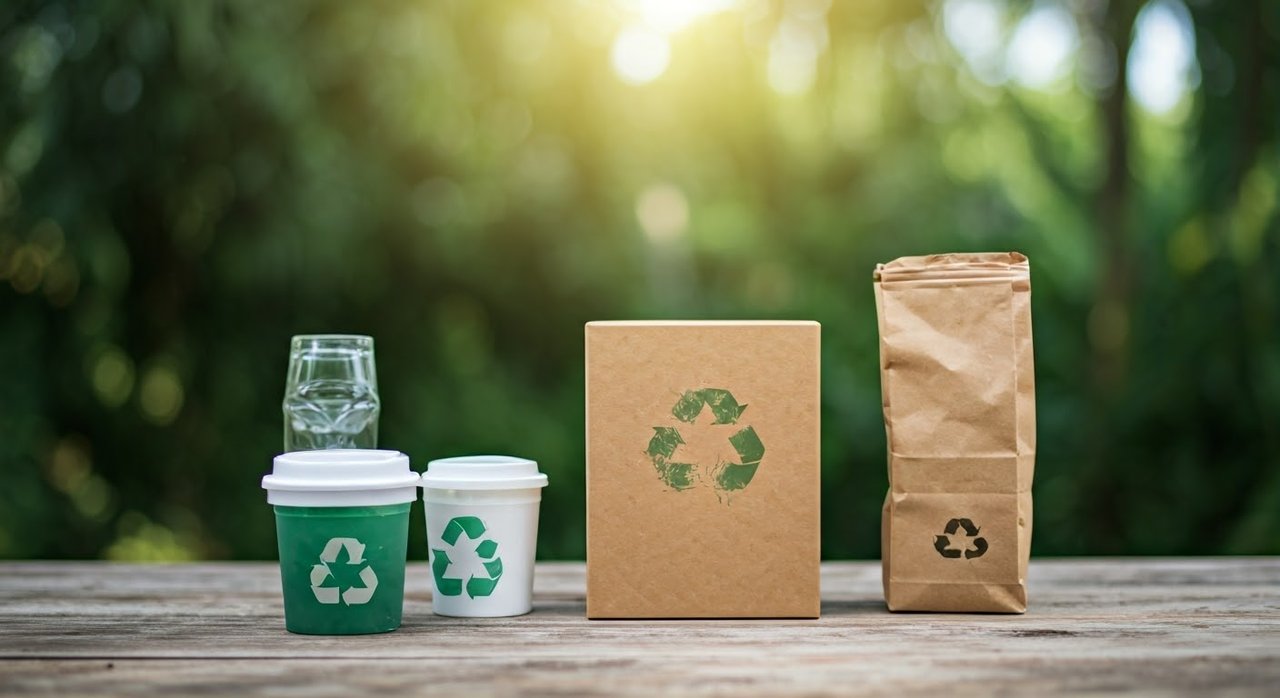On this page
The German Packaging Act (VerpackG) applies to all manufacturers and sellers who package products for the German market. To comply with the law, you need to register with the LUCID Packaging Register and find a Dual System Operator to license your packaging. It's essential to know the types of packaging you use, such as product, shipment, or sales, for proper licensing and data reporting. Costs can differ based on the type of packaging materials; always aim for reusable and sustainable packaging when you can. Not following LUCID rules may lead to large fines, sales bans, and harm to your brand's reputation.
Recycling in Germany
This blog post explains the German Packaging Act for manufacturers. We will cover the important parts of joining the system, including the LUCID Packaging Register and what Dual System Operators do. By learning these key points, manufacturers can follow the law and fulfil their system participation obligation on a commercial basis. This not only ensures compliance but also helps create a better circular economy in Germany.

LUCID Packaging Register and the Central Agency Packaging Register?
The LUCID Packaging Register was created under the VerpackG and is run by the Central Agency Packaging Register (ZSVR). This register keeps a complete list of all manufacturers, distributors and companies in general who package products for the German market.
The goal of the LUCID Packaging Register is to increase transparency in the packaging industry. It lets consumers and other businesses check if companies are following the law. They must register and report their packaging details.
This information is available to everyone here. It helps people make sure businesses are responsible and encourages better packaging practices.

Licensing your Packaging with Dual System Operators
Dual System Operators (DSOs), are important for waste management in Germany. These are certified private companies, that collect, sort, and recycle packaging waste from homes.
When businesses hire a DSO, they follow the principle of Systembeteiligung (system participation). This way, they meet their product responsibility by helping to pay for the recycling of their packaging.
Picking the right DSO matters a lot. You should look at things like their recycling rates, the services they offer, and their support for sustainable packaging solutions.
Packaging Types and Volumes
Be Smart about it!
Understanding the types of packaging for your products is important for keeping costs low while following the VerpackG rules. By looking at your packaging needs and choosing eco-friendly options when possible, you can save money and reduce your impact on the environment.

Disposable packaging - What type is the cheapest?
When you think about disposable packaging (dt. Einwegverpackungen), it’s important to know that the material you choose will affect the license fees. Here’s how common packaging materials stack up in cost-effectiveness, from the best option to the worst:
- Paper/Cardboard: Usually the cheapest choice for disposable packaging because they can be recycled a lot.
- Glass: Glass can be recycled well, but it is heavy. This extra weight can raise transport costs, making it a bit less cost-effective than paper.
- Plastics: Plastics are light, but there are many types. This, along with different recycling rates, can change costs.
- Multi-layer composites: These materials are harder to recycle. Therefore, they are often the least cost-effective choice.
This shows how helpful it can be to choose materials that can be recycled easily and to use reusable packaging whenever you can.
Reusable Packaging - What to consider
Reusable packaging (dt. Mehrwegverpackungen) is becoming more popular in our modern world. One objective of the packaging act VerpackG is, to incentivise businesses to think about their packaging and make it lucrative for them to introduce reusable packaging. If done right, reusable packaging do not have to get registered with your Dual System Operator at all. However, making reusability work takes careful thought, good planning and might not be a feasible for business.
Here are some points to think about:
- Durability: Choose packaging that lasts through many uses. This helps reduce the need to replace it.
- Logistics and Cleaning: Set up systems to collect, check, clean, and redistribute reusable packaging efficiently.
- Material Compliance: Pick materials that meet the 'Mindeststandard der ZVSR' (minimum standard of the ZSVR) for reusable packaging. This ensures they can be recycled later.
A smart reusable packaging system can lower environmental harm and save money over time.
Think about your needs when choosing a Dual System Operator
Choosing the right Dual System Operator (DSO) for your business is very important. It helps you keep in line with regulations and improve your packaging recycling process.
Product Packaging
Product Packaging, or "Produktverpackung" are generally subject to system participation. This means it involves any packaging material that holds and protects the product sold to consumers. It includes the packaging right around the goods and any extra layers used for marketing or branding. Manufacturers need to report and register the amount and type of product packaging with their chosen DSO. They have an obligation to participate in the dual system.
Shipment Packaging
Shipment Packaging, or "Versandverpackung", includes the outside materials used for shipping and logistics. This is guided by the VerpackG law. This group includes boxes, tapes, fillers, and other protective items. They help keep products safe during their journey until they reach the customer. Even though consumers do not buy shipment packaging directly, it still needs to be thrown away later, adding to packaging waste. Because of this, producers need to register these materials with their DSO. This step makes sure they are handled correctly in the recycling system.
Sales Packaging
Sales packaging, or "Serviceverpackungen" under the Packaging Act, means the packaging that businesses use to give products to consumers at the store. This can include things like takeaway containers, wrapping paper for baked goods, or bags from shops. Even though it is not the main product packaging, sales packaging needs to be included in system participation as well. This is because it is thrown away by the private end consumer. So, businesses have to carefully estimate and register their service packaging amounts with a DSO. This is important to meet their legal requirements. Sales packaging are the only type of packages that can be purchased with a license. If you choose to buy licensed packaging for your business, you would not have to register these with a Dual System Operator. However, you are still obligated to register with LUCID and provide proof that your packaging is licensed and in circulation.
Repackaging
When it comes to repackaging, or "Umverpackungen", manufacturers need to ensure compliance with system participation obligations as well. Repackaging involves the process of altering the packaging of goods that have already been packaged. Proper documentation and registration of repackaged items in the central agency packaging register are essential to maintain transparency and accountability in the system participation framework.
Implementation
To successfully implement the LUCID Packaging Register and engage with dual system operators, manufacturers must register with the central agency packaging register. This registration is crucial for system participation, ensuring compliance with packaging regulations. By adhering to the minimum standards set by the ZSVR, manufacturers can fulfill their product responsibility within the circular economy framework. Effective implementation involves understanding the need for systembeteiligungspflichtige Verpackungen and navigating the responsibilities and obligations outlined in the German packaging act, ultimately contributing to sustainable packaging practices in Germany.

Example
Theoretical concepts can be illustrated with a practical example, such as in the case of a manufacturing business producing electronic devices like smartphones. Registration of all product packaging is essential, including the paper box, plastic screen protector, and any other packaging materials necessary for protecting the smartphone. When selling that smartphone in a physical store setting, registration is required for service packaging like plastic or paper bags provided to customers for carrying the smartphone. For online sales, registration of all shipment packaging such as paper boxes and plastic bubble wrap is necessary. Considering the total packaging used prompts a consideration of reducing packaging or transitioning to reusable options. Through a thorough evaluation of these aspects, businesses can select a DSO that meets their needs and sustainability goals effectively.
Selector Tool
Our selector tool is designed to simplify the process of choosing the right Dual System Operator (DSO) for your business. By utilizing this tool, you can save valuable time and ensure that you make an informed decision based on your specific needs and requirements.
The selector chooses a Dual System Operator based on your individual packaging quantities that need to get licensed. This way, you can easily narrow down your options and find the DSO that best aligns with your business objectives.
Find the right DSO for your business
Conclusion
In conclusion, it is important to know the LUCID Packaging Register and the role of Dual System Operators. This understanding helps manufacturers comply and work efficiently. By selecting the right types and amounts of packaging, you can make your operations smoother and avoid penalties. Think about whether to use disposable or reusable packaging and pay attention to the specific needs of your products, shipments, and services. Use the selector to find the best Dual System Operator for your business. For more help with these steps, connect with our experts today.
Need help with your business?
Simply enter your email and we will get back to you as soon as possible!






